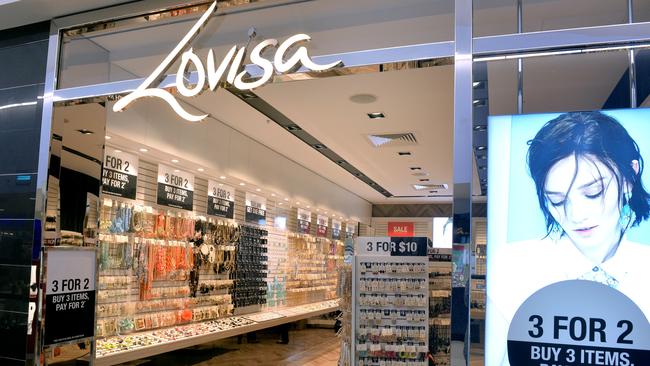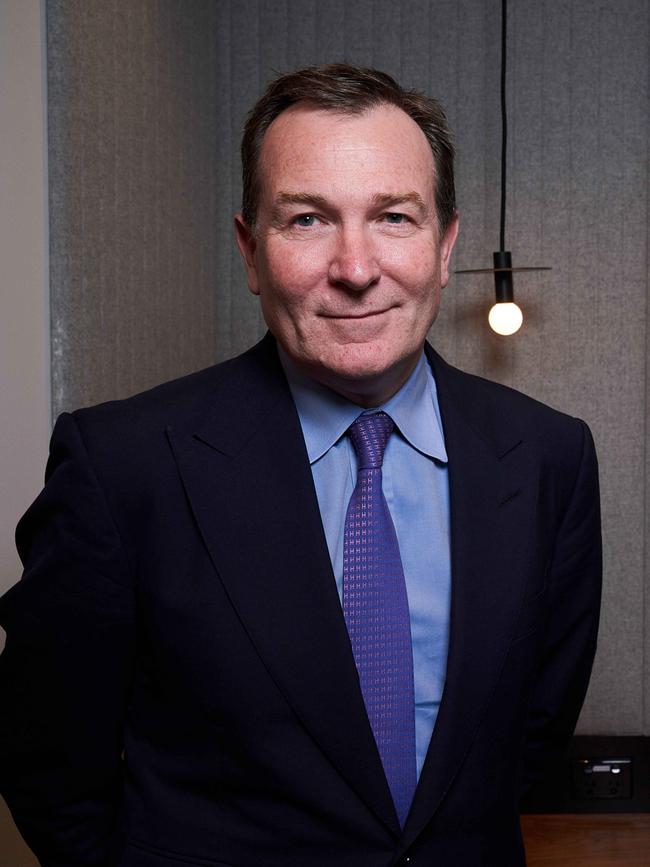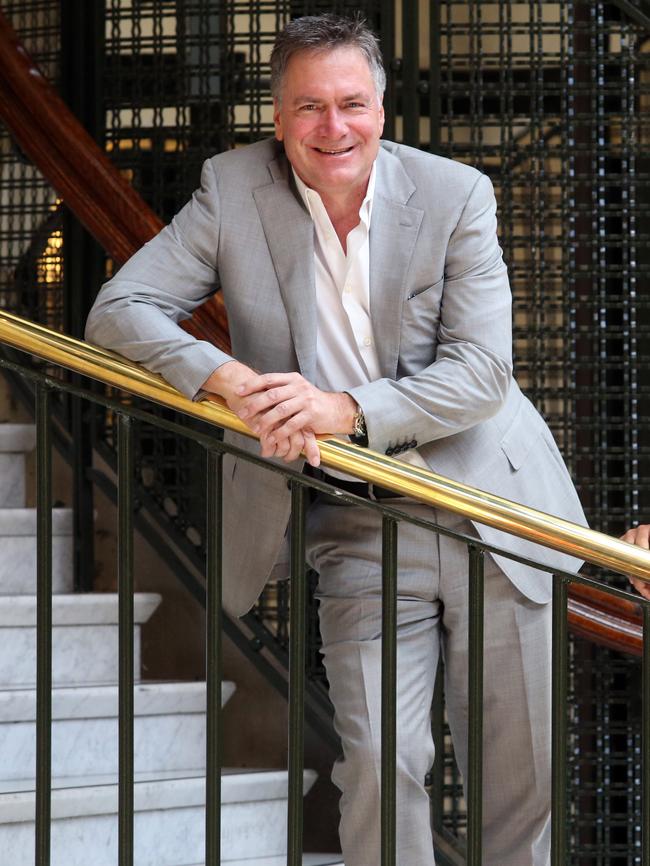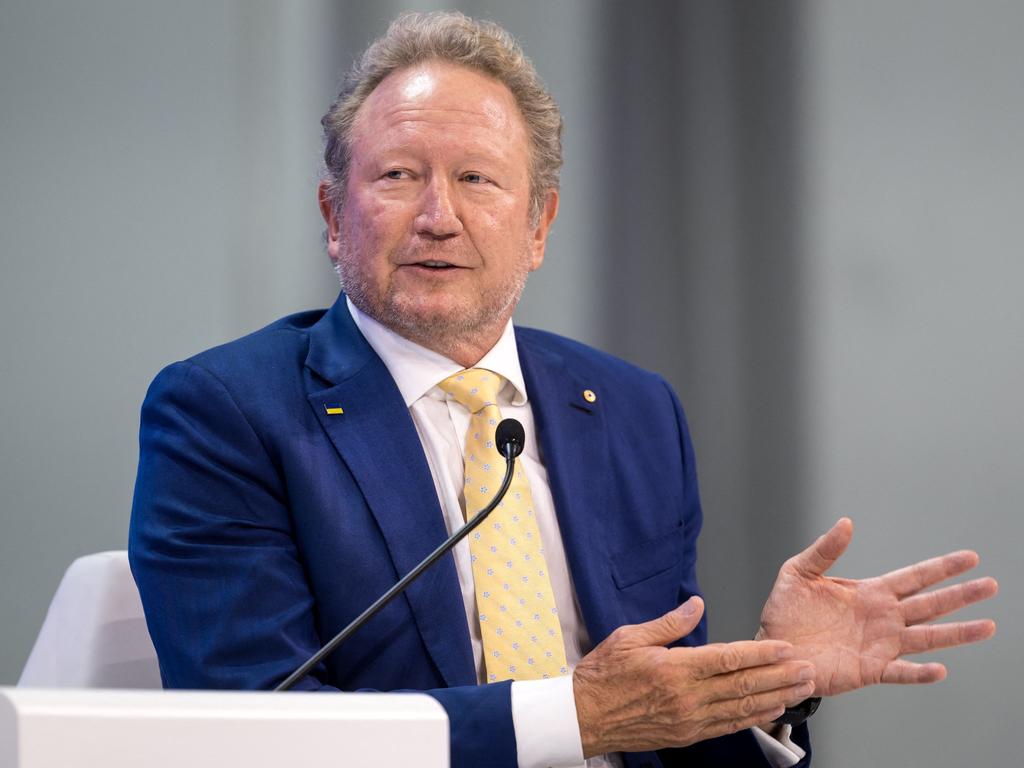Mark McInnes looks past Myer and others with plans to build another retail empire
The former Premier Investments and David Jones boss has turned his back on Myer and others to work for another retail billionaire.

Business
Don't miss out on the headlines from Business. Followed categories will be added to My News.
Even after two years off the management grid, travelling with family, school lunches and pick-ups, long-serving retail boss Mark McInnes kept his retailing instincts sharpened.
Now, McInnes is back on the market with a plan to build another Premier Investments and potentially float it on the ASX.
McInnes has surprised many by looking past a handful of executive job approaches including Myer and David Jones, and has opted to work for another retailing billionaire. This time he will be running Brett Blundy’s private investment vehicle BBRC with the aim of building it into a retail powerhouse.

It is almost two years to the day McInnes flagged his exit from billionaire Solomon Lew’s Premier retail empire after 10 years in the top job.
Lew had such high regard for his former chief executive he essentially had McInnes locked away from the market for 24 months.
These restrictions came off on January 18 and since then McInnes has fielded approaches from department store major Myer, which is in the hunt for a new chief executive. Lew is now sitting on a 29 per cent stake in Myer so he would have returned to his old boss of sorts.
Rival department store operator David Jones, now sitting in the hands of private equity owner Anchorage Capital, also made an approach. Such a move would have seen him make a return to the retailer he was forced to resign from in 2010.
Blundy, who famously made his fortune through the Sanity record chain in Australia, now has an arc of retail investments that spans fast-fashion and jewellery, homewares and footwear.
And, a little over a year ago, BBRC acquired discount department store Best & Less for $200m, a business now run by long-term Blundy partner Ray Itaoui.
BBRC has a cornerstone stake in a number of ASX-listed brands such as BLG, Accent Group, Dusk, Adairs and the $2.5bn fashion group Lovisa. It fully owns a string of smaller retail brands both here and offshore.
By taking charge of the retail brands portfolio, Blundy’s brief for McInnes is to bring them together to make Blundy’s diverse investments bigger than the sum of their parts. Each of the listed businesses like Lovisa and Universal Stores continue with their own separate management teams and boards, but for McInnes BBRC represents a bigger strategic play than a single brand executive role. In short, McInnes has been given the challenge of building up another Premier Investments-style house of retail brands. This too will involve acquisitions.
“Brett and BBRC have ambition. Brett’s experience, balance sheet capacity and ambition in the retail sector was particularly attractive – as was the chance to work with another icon of Australia’s retail scene,” McInnes tells The Australian.
“Brett actually wants significant growth in both the public and private retail and consumer market. I believe the combination of his experience and firepower and my background will deliver results.”
McInnes declines to discuss any approaches for executive roles that were made after he finished up extended gardening leave, however says the opportunity given to him by Blundy is the “best next step”. Marking McInnes’ third chief executive appointment, a long-term commitment to Blundy would probably his last.

Working with Lew at Premier for more than a decade, McInnes brought together the offshore expansion of Smiggle and built Peter Alexander into an online powerhouse. He also forged Premier’s online strategy, allowing brands like Just Jeans, Portmans and Dotti to work off a single platform.
At BBRC all options will be considered to maximise value, including forging major supply chain savings or having brands work together more effectively.
Many expect a stock market listing will eventuate and this follows Blundy previously mulling plans to float part of BBRC. However to do this BBRC needs to be more than a retail cash box.
McInnes will continue to be based in Melbourne, although the demands of the new job will see him spend time in the US where Lovisa operates, as well as keep options open for expansion into Europe.
On Monday, Blundy said: “Mark’s retail credentials are second-to-none, having led incredible transformations of some of Australia’s greatest retail companies over the last 20 years and delivered some truly amazing results.
“BBRC has ambitious growth targets and we are excited to have Mark on board to help us achieve them.”
Even after two years off the market, McInnes isn’t surprised around the resilience of retail, despite interest rates tracking at more than decade-long highs.
“Consumers are still spending, although at a slower pace, because the jobs market remains robust,” McInnes says. “And it is this factor that has caught many market analysts by surprise.
“If you go back through history, there’s little correlation between interest rate rises and recessions. The stronger correlation is between unemployment and recession. And it looks like employment in the United States and in Australia is holding up.”
The next two weeks are likely to see a string of profit updates from more retail names including Accent Group, the owner of shoewear chain Athletes Foot; department store major Myer; online player Kogan.com; and Mosaic Brands.
Lithium Crash
Hold tight, that’s the sound of the lithium bust well and truly on. Billions of dollars have simply sunk back into the ground.
With the pace of electric vehicle sales slowing globally and more lithium supply still flowing onto the market, pricing for the battery material has cracked. That crack just got bigger as the Tim Goyer-backed Liontown has been forced to dramatically scale back ambitions after being unable to lock in a $760m debt funding package for its Kathleen Valley project given the spodumene crash.
The sting is it comes just months after mining billionaire Gina Rinehart bought a blocking stake, forcing US producer Albermarle to shelve its $3.00 a share offer. Albermarle formally cut ties with Liontown last week. Liontown on Monday ended at 94c. Rinehart, who has a 19.9 per cent stake, is prevented from making her own bid until mid-February. The question is what exactly would Rinehart be bidding for if she finally shows her hand and comes back for a lowball bid?
Liontown has more than $500m in cash, including the $300m funding drawn down from automaker Ford. Liontown chief Tony Ottaviano has said a smaller development project Kathleen Valley is now more likely in line with a downscaled finance package.
Earlier this month Core Lithium halted mining at its costly Finniss project in the Northern Territory while Leo Lithium raised cash from China’s Ganfeng at a heavily discounted rate. Like all crashes, cash is king and those with deep pockets and an appetite for deal making will likely emerge from the crash bigger and stronger.
One to watch is Wesfarmers, which has committed up to $1.3bn on a new domestic processing plant and Mt Holland lithium mine in Western Australia. Wesfarmers has tipped first earnings from the Covalent lithium venture some time in the June half.
While 2024 won’t be pretty, everyone remains bullish on the long-term outlook for lithium and battery demand is underpinning what’s left of the boom. Any change to that outlook will be terminal for some.
johnstone@theaustralian.com.au
More Coverage
Originally published as Mark McInnes looks past Myer and others with plans to build another retail empire





